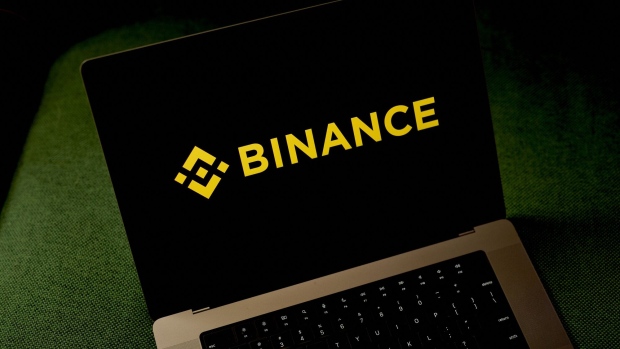Jun 7, 2023
Binance Money Trail Reveals $70 Billion Flowing Through Silvergate, Signature
, Bloomberg News

(Bloomberg) -- Crypto exchange Binance and related entities shuttled some $70 billion through accounts at now-defunct Silvergate Bank and Signature Bank from 2019 up until this year, including “large amounts of money” flowing in and out within days, according to new details revealed in a filing Wednesday.
Silvergate facilitated more than $50 billion in deposits for Binance-related parties, while Signature handled more than $19 billion, the 27-page document, which was filed Wednesday in US District Court in Washington, shows. Some of the funds flowed out to foreign entities, according to the filing, which cited a review of financial records including bank statements, deposits, canceled checks and wire transfers.
The SEC this week sued Binance, its co-founder Changpeng “CZ” Zhao and Binance.US for “blatant disregard” of US securities laws, including mishandling customer funds and misleading investors and regulators, part of a widening crypto crackdown following a wave of blowups last year including the collapse of Sam Bankman-Fried’s FTX exchange. On Tuesday, the agency filed an emergency action application for a temporary restraining order to freeze Binance.US’s assets in attempt to protect customer funds, including through the repatriation of client investments held abroad.
Read the SEC’s complaint here
While the SEC’s case against Binance includes allegations it mishandled client funds, the provenance of the money and the purpose of the transfers described in the Wednesday document weren’t specified. The filing was in support of the motion to freeze assets of Binance.US, and didn’t include any fresh charges. A company spokesman told the New York Times the transfers didn’t involve client funds and were done in the normal course of business.
‘Red Flag’
Banks generally are expected to monitor money flow for unusual transactions including large transfers, according to John Popeo, partner at the Gallatin Group, which advises banks and other firms on regulatory issues. It’s unclear whether Silvergate or Signature Bank did so in the instances detailed in the filing, or whether they needed to.
“If there’s a frequent large cash movement — it could be extraterritorial or it could be domestic — that to me is a red flag,” Popeo said.
Binance didn’t respond to a request for comment. A representative for Binance.US declined to comment to Bloomberg. Silvergate and New York Community Bancorp, which bought Signature, didn’t respond to requests for comment outside of usual work hours.
Many of the Binance and related accounts participated in Silvergate’s SEN network and Signature’s Signet platform. The electronic-payments systems allowed users to transfer funds seamlessly and instantaneously, 24 hours a day, before they were shuttered earlier this year when their parent companies ran into trouble. Signature was shut down by regulators in March after a run on deposits. Silvergate announced it would voluntarily shut down the same month.
Big Flows
Often, amounts in the accounts would be relatively small at the beginning and the end of the month, but have huge inflows and outflows in between.
“At times the amounts being credited and debited during a single month amounts to movement of more than a billion dollars,” the filing said. “For example, in July 2021, one Signature Bank Binance Holdings account shows a starting balance of $468 million, deposits of $1 billion, withdrawals of $1.3 billion, and an ending balance of $179 million.”
Accounts at the two banks paid out funds to a yacht seller, and for “insured aircraft title service,” the filing said.
Zhao was also the beneficial owner of numerous other foreign companies with accounts at Signature Bank, the filing said, including those domiciled in Canada, the UAE, Seychelles, Singapore, Lithuania and Kazakhstan. Some of the money eventually ended up in Zhao’s personal account, per the filing. Some flowed to Amazon Web Services, and some to Stifel Bank, the filing said. Representatives for AWS and Stifel didn’t respond to a request for comment.
Merit Peak
At Silvergate, in 2020 and 2021, one Binance entity alone, called Key Vision, had deposits and withdrawals of more than $13 billion, the filing shows, with nearly all deposits transfered to another entity named Merit Peak, identified in the SEC’s suit as being controlled by Zhao. Between 2019 and 2021, Merit Peak accounts received $22 billion, including about $11 billion from Key Vision, $7.2 billion from other Binance-related parties, and $1.2 billion from BAM Trading, one of the corporate entities of Binance.US, per the filing.
Merit Peak paid most of that money — $21.6 billion — to a foreign affiliate of Paxos, which stopped issuing Binance-branded BUSD stablecoin under regulatory pressure earlier this year. Binance entities commingled funds at Merit Peak, according to the filing.
A spokesperson for Paxos said the company is closely following the allegations against Binance.
“In February 2023, Paxos announced its decision to end its relationship with Binance and has since been successfully winding down all business relationships” with the company, the Paxos spokesperson said in a statement. “The complaint against Binance does not allege any wrongdoing by Paxos. We will continue working with all government efforts to bring bad actors to justice.”
Silvergate directed for Binance-related accounts to be closed in December, and their account balances were zero by the end of March, the filing said.
--With assistance from Max Reyes.
©2023 Bloomberg L.P.





